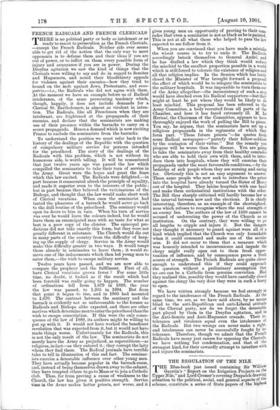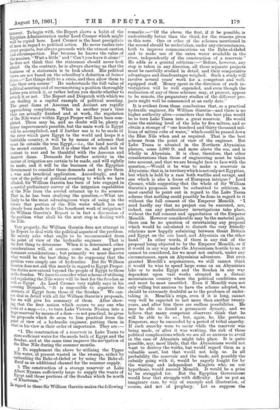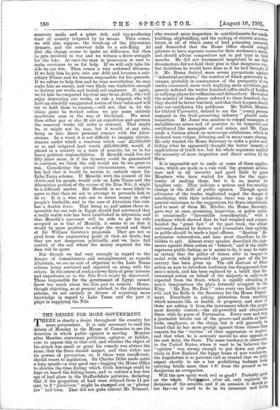THE REGULATION OF THE NILE.
THE Blue-book just issued containing Sir William Garstin's "Report on the Irrigation Projects on the Upper Nile," and Lord Cromer's covering Despatch drawl attention to the political, social, and general aspects-of the scheme, constitute a series of State papers of the highest interest. To begin with, the Report shows a . habit of the Egyptian Administration under Lord Cromer which might well be copied here. Lord Cromer is the least precipitate of men in regard to political action. He never rushes into meat projects, but always proceeds with the utmost caution and circumspection. But because he ]mows the value of the maxims, "Wait a little " and " Can't you leave it alone? " he does not think that the statesman should never look ahead. On the contrary, he is always showing us that the business of a statesman is to look ahead. His political views are not based on the schbolboy's definition of Wager faire,—" Let things drift to a crisis, and then allow them to take their own course." He understands the full value of political scouting and of reconnoitring a position thoroughly before you attack it, or rather before you decide whether to attack it or not. The Report and Despatch with which we are dealing is a capital example of political scouting. The great dams at Assouan and Assiout are rapidly approaching completion. When in another year's time they are actually finished and at work, the regulation of the Nile water within Egypt Proper will have been com- pleted. There may be, and no doubt will be, plenty of minor improvements possible, but the main work in Egypt will be accomplished, and if further use is to be made of the river which gave Egypt to the world and keeps it a habitable country, it will be by means of schemes that must lie outside the true Egypt,—i.e., the land north of the second cataract. But it is clear that we shall not be content to rest and be thankful with the Assouan and Assiout dams. Demands for further activity in the matter-of irrigation are certain to be made, and will rightly be made, and it will be the business of the Egyptian Government to consider these demands and to give them a wise and beneficial. application. Accordingly, and in view of the policy of political scouting to which we have alluded. Sir William Garstin has been of late engaged in a careful preliminary survey of the irrigation capabilities of the Nile from the second cataract up to its sources. That is, he has been studying the question,—What are likely to be the most advantageous ways of usins, in the future that portion: of the Nile water which using not already been made to do the beneficent work of irrigation ? Sir William Garstin's Report is in fact a discussion of the problem what shall be the next step in dealing with the Nile.
Very properly, Sir William Garstin does not attempt in his Report to deal with the political aspects of the problem. lie merely asks what ought to be recommended from the point of view of the hydraulic engineer. That is the first thing to determine. When it is determined, other considerations will, of course, come in, and may prove dominant considerations ; but primarily we must discover what would be the best thing to do supposing that the problem were simply one of hydraulics. But Sir William Garstin does not ask this merely in regard to Egypt Proper. Our duties now extend beyond the people of Egypt to those in the Soudan. We have to consider what scheme of utilising and regulating the Nile water will be best for the Soudan as well as Egypt. As Lord Cromer very rightly says in his covering Despatch, " It is impossible to separate the interests of Egypt from those of the Soudan.' We can- not deal in detail with all Sir William ,Garstin's proposals, but we will give his summary of them. After show- ing that the first notion which occurs to any one who looks at a map—i.e., to turn Lake Victoria Nyanza, into a huge reservoir by means of a dam—is not practical, he gives the proposals which do seem to him practical from the point of view of a hydraulic engineer, putting them in what in his view is their order of importance. They are :— "1. The construction of a reservoir in Lake Tsana to store sufficient water for the needs both of Egypt and the Soudan, and at the same time improve the navigation of the Blue Nile during the summer months. - 2. To supplement the above by utilising the Upper Nile water, at present wasted in the swamps, either by embanking the Bahr-el-Gebel or by using the Bahr-el- Zeraf as an additional channel for the summer supply. 3. The construction of a storage reservoir at Lake Albert Nyanza sufficiently large to supply the wants of Egypt and those portions of the which lie north of Khartoum."
regard to these Sir Willia,- m Garstin makes the following remarks :—" Of the above, the first, if it be possible, is undoubtedly better than the third, for the reasons given in this note. - One or other of the schemes mentioned in the second should be undertaken, under any circumstances, both to improve communications on the Bahr-el-Gebel and to make use of the extra water available in the river, independently of the construction of a reservoir." He adds as a general criticism :—" Before, however, any step is taken in any direction, all these separate projects must be carefully studied in detail, and their comparative advantages and disadvantages weighed. Such a study will involve several years' work. for_ .competent and well- equipped staff. Money spent in the direction of such in- vestigation will be well expended, and even though the realisation of any of these schemes may, at present, appear. to be remote, the preparatory studies of the different pro- jects might well be commenced at an early date."
It is evident from these conclusions that, as a practical hydraulic engineer, Sir William Garstin—and there is no higher authority alive—considers that the best plan would be to turn Lake Tsana into a great reservoir. He would raise the existing level of the lake by five metres, and so obtain a storage of " one hundred and thirty thousand mil- lions of metres .cube of water," which could be passed down" the Blue Nile when and as required. That is the best scheme from the point of view of the engineer. But Lake Tsana is situated in the Northern Abyssinian plateau, some 5,000 ft. and more above the sea, and is wholly in Abyssinia. It is clear, therefore, that other considerations than those of engineering must be taken into account, and that we are brought face to face with the question,—Would it be wise to make a reservoir in Abyssinia; that is, in territory which is not only not Egyptian, but which is held by a race both warlike and savage, and one which is also a focus of European intrigue ? Lord Cromer, while suggesting that the whole of Sir William Garstin's proposals must be submitted to criticism, is most careful to point -out in regard to the Lake Tsana scheme that nothing could possibly be done in regard to it without the full consent of the Emperor Menelik. " I need hardly say that no project can .be executed, nor, indeed, can any preliminary investigations take place, without the full consent and approbation of the Emperor Menelik. However considerable may be the material gain, there can be no question of entertaining any proposal which would be calculated to disturb the very friendly relations now happily subsisting between Great Britain and Egypt on the one hand, and Abyssinia on the other hand." In other words, if there is any risk of the proposal being objected to by the Emperor Menelik, or if it would in any way make the Abyssinians hostile to us, it cannot be considered, for we must not embark, under any circumstances, upon an Abyssinian adventure. But even, granted Menelik's acquiescence, we still cannot think it would be. wise to spend large sums on. an Abyssinian lake or to' make Egypt and the Soudan in any way , dependent upon vast works situated in a distant mountainous country where the political, conditions are and must be most unsettled. Even if kenelik were not only willing but anxious to have the scheme adopted, we should be extremely doubtful as to the prudence of under- taldng it. Menelik's reign, even if it is long, cannot very well be expected to last more than another twenty years, and after him there are endless possibilities. He may be able to found a permanent dynasty, and we believe that many competent observers think that he will be able to do so ; but, again, he, like previous Emperors; may be succeeded by a period of tribal anarchy. If such anarchy were to occur while the reservoir was being made, or after it was working, the risk of those political complications which we are all so anxious to avoid in the case of Abyssinia might take place. It is quite possible, nay, most likely, that the Abyssinians would not want to destroy the works, but would regard -them as a' valuable asset, but that would not help- us. In all probability the reservoir and the trade, and possibly the subsidy going with it, would be eagerly fought for by the warring and indepehdent Kinglets who, on our hypothesis, would succeed Menelik. It would be a prize' to be struggled . for. But the Egyptian Government would bear that struggle with difficulty: Let us put an imaginary case, by way of example and illustration, of course, and not of prophecy. Let us suppose the reservoir made, and a great. rich, and ta-prodneing tract of country irrigated by its means. Then comes, we will also suppose, the .break-up of the Abyssinian dynasty, and the reservoir falls to a sub-King. At - first the' change seems to make no difference, but .then .lie gets involved in war and we witness a fierce struggle for the lake. At once the man in possession is sure to Mike overtures to -us for help. If we will only take his side he can win. Then comes a very awkward dilemma. If -we help him he gets into our debt and becomes a sub- sidiary -Prince and we become responsible for his quarrels. If we refuse to help him and he wins nevertheless, we may make him an enemy, and very likely one vindictive enough to 'destroy our works and banish our engineers. If, again, we let him be conquered his rival may be an Attila, who will enjoy destroying our works, or else a brigand; who will have an absurdly exaggerated notion of their value and will by to hold them to ransom,—will not, that is, let the sluice gates be worked unless we pay some entirely exorbitant sum in the way of black-mail. We must then either pay or else fit out an expedition and garrison the reservoir works till order' is restored. That might be, or might not be, easy, but it would, at any rate, bring us 'into,' direct - -personal contact - with the Abys- sinians.: In a word, it is not difficult -to imagine 'circuin- stances- under which -a reservoir which cost- .22-,000,000 Or so and'-irrigated land • worth. X20,000;000,- would; if pliteed in a country in 'a state of . anarchy,'let us In for heavy, political responsibilities: If Menelik could live for fifty years more, or 'if his dynasty could be guaranteed toleontinue, we :think- the risk would not. be too great to rim. .% Considering!. the actual circumstances, we cannot btit :feel that it would be unwise to -embark upon -the take Isaria scheme. If Menelik, with the consent of ' his chiefs and his people, would cede us Lake Tsana, and the 'Abyssinian portion of the course of the Blue Nile, it might ht be a different matter. But Menelik - is no more likely to agree to that than we are to attempt to persuade. him to do so. It is' a wise rule not to invest money in other people's freeholds, and in .the case of Abyssinia, this rule has a double force. That being so, and unless those re- sponsible for our rule in Egypt should feel convinced that a really stable rule has been established in Abyssinia, and that Menelik's successor will be able to get his rule accepted as is' that of Menelik, it seems to us- that it Would be more prudent to adopt the second and third of Sir William- Garstin's proposals. They are not • so good from the engineering -point •of view, no doubt, but they are not dangerous politically, • and - we have . full .control of the soil where the money required for the dim will be spent.
But though we feel very strongly in regard to - the danger of commitments and entanglements as regards Abyssinia, we sea no sort of objection to the Lake Tsana scheme being surveyed and reported on along with the others. In the course of such a survey facts of great interest and importance as to the Nile flood might be discovered. those responsible for the government of Egypt cannot know too much about the Nile and its sources. Hence, 'though objecting, as at present advised, to the Abyssinian 13 cheme, we are entirely in- favour of acquiring more knowledge in regard to Lake Tsana and the part it plays in supplying the Nile.




































 Previous page
Previous page